Eddington's Americana Lunacy - Cannes Week 1
Cinematic Power Struggles and Confrontations with Death
This is part one of my coverage of the Cannes Film Festival 2025. You can read part two here, or watch my video coverage on my channel.
“Excuse me,” she said approaching our circle of critics cautiously. “Are you from the States?” (It was apparently the New Yorker tote that gave it away).
She wanted to know what someone from the US thought of what we had just watched—the premiere of Ari Aster’s Eddington. The maximalist-panic-attack-reflection of COVID era insanity, which feels like a kind of deranged Americana, is riddled with the tiny details that make American life feel like an absurdist dark-comedy at times. I had wondered during the screening how the mostly European audience was perceiving the film, and now we were being asked as Americans for our perspective. The general consensus: It felt unfortunately real.
That’s not to say Eddington, which premiered last night at the Cannes Film Festival and which comes out in the US in July, isn’t over the top or surreal in ways. But I did find myself facing the uncomfortable reality that as absurd as movie the movies is, it’s not that unrealistic—at least not by the standards of the last 5 years in America. And that seems to be Ari Aster’s objective here (if he has one)—to hold a mirror up to American Absurdism and makes us all look at ourselves.
The circle of critics I was standing in was somewhat split, many (myself among them) found a cathartic entertainment in this funhouse mirror but a few felt it lacked substance beyond that. It’s certainly a film that will be no less polarizing as it reaches wider audiences, but how could a depiction of American life in 2020 not be? Isn’t that part of the absurdity? That any depiction of our own recent reality polarizes us?
Eddington was my seventh screening, capping off my fourth night at Cannes. Below you’ll find my full review along with my recap of everything else I watched in the first week here of the Cannes Film Festival.
Power struggles, whether they’re against patriarchy or the state or within a society have been the pervasive theme within all the films I’ve seen at Cannes so far. When the movies have deviated from this theme it’s to instead face and confront death. All this to say it’s been a frolic.
Perhaps these themes reflect the interests of the selection committee at Cannes, but I suspect just as much it reflects the current preoccupations of the artists making the films. Socially and globally we’re at a place of renewed destabilization. While things have never been perfect (far from it) some of the assumed promises of modernism, neoliberalism, and inevitable progress towards greater freedom are being forced into question. Much of the art cinema I see these days (not just at Cannes) feels like it’s grappling with these big questions, and trying to understand our place within this shifting landscape.
2000 Meters to Andriivka
Special Screening / dir Mstyslav Chernov / Ukraine
I got into the fest and picked up my badge just in time to slip into a special screening of Mstyslav Chernov’s new documentary, 2000 Meters to Andriivka. His previous film, 20 Days in Mariupol (which won Best Documentary that year at the Oscars) is a harrowing and insightful documentary that covers the early days of Russia’s invasion of Ukraine.
The last time I was at Cannes in 2022, the invasion had just begun, so to return years later, and begin the fest with Chernov’s second film about the conflict, drives home just how protracted this war has been.
His new film tracks a specific operation within Ukraine’s difficult 2023 counter-offensive, and it gives us a glimpse of modern warfare in a way no piece of media I’ve seen has before. It operate effectively on several levels:
It’s a harrowing depictions of the hellish intensity of combat. Evocative of Alex Garland’s recent Warfare—but instead as a documentary. As the film opens we’re immediately immersed within subjectively shot combat footage. It’s the most intense capturing of real world combat I’ve ever seen and it is not for the faint of heart. There are several of these horrific combat sequences, stitched together from first person helmet cams worn by the soldiers, and they document a few battles in the protracted struggle to claim one 2000 meter strip of forest leading to the village of Andriivka. These sequences are broken up by Mystslav’s own journey following a group of soldiers through the region towards the end of the operation.
What elevates 2000 Meters beyond just a visceral depiction of the reality of combat is the way Chernov position this operation as just one event within a conflict that has happening for thousands of years. 2000 Meters is not just a look at the fight to claim Andriivka, it’s a look at the nature of why men go to war and die over pieces of land.
Some of the film’s most moving and provocative sequences are actually when the viewer and the soldiers have a break from the combat. Hiding in fox holes while shells and gunfire explode around them, they connect with the filmmaker as humans, smoking, chatting about school, their families, or what they’re going to do when they’re get home from the front (if they do).
Throughout, Chernov reflects on his own role in all this. Asking us to consider the role the camera plays in these conflicts. In his personal introduction to the film at Cannes he described the documentary as his way of carrying the flag for the soldiers from the film who lost their lives. Its a kind of raising of a banner that ultimately might be more symbolic than strategically meaningful in the grand scheme of the struggle.
This documentary gives us a first hand account of a small piece of the latest military conflict in Europe since World War II, and beyond being politically relevant for understanding the nature of the ongoing invasion, I don’t think I’m exaggerating when I say it will likely find a place as one of the most significant war documentaries ever made. It should be recognized not just for its documentation of these events, but for what it has to reveal about the nature of war itself, and it’s excellence of craft as a documentary.
If you think you can handle seeing real violence, it comes highly recommended.
The Sound of Falling
In Competition / dir Mascha Schilinski / Germany
We get impressions of life—the haunting moments where you awaken to your loneliness, the disconnect between yourself and reality, the places where there is a rift which one feels must be reconciled. There is curiosity about this, but also horror. These moments awaken in youth but are held in those with age. Around these moments lingers the specter of death, but they exist adjacent to an enveloping warmth.
Sound of Falling, the second film from director Mascha Schilinski (only the first of her work that I’ve seen) is a multigenerational coming-of-age existential horror film, sewn through with sorrow and foreboding that lingers at the fringes before finally becoming a reality in the third act. You’ve heard of the male gaze. This is the death gaze. I’m writing about it with this broken and disconnected language because that is how it presents itself, in fragments, initially disjointed; the characters, places and timelines seem at first connected only by a sort of haunted resonance. They come into clearer focus by the end, but as a first time viewer the connections still felt tenuous by as the credits rolled, perhaps more spiritual than chronological and causal.
It’s a beautiful film, conjuring images that feel as enchanted as often as they are disconcerting. Its structure and use of these imagery evokes Tarkovsky, while the atmospheric sound design is reminiscent of Lynch. As a technical piece of filmmaking this is was my favorite film so far, with each department working in concert to delivery a unique but aesthetically cohesive whole.
Within this frame, oppression, sexual violence and awakening, objectification, unhappiness, depression, and ultimately, death and the realities that might draw someone towards it as an escape from those other things, are explored through the interiority of the young girls and women at the center of the film.
Perhaps too challenging and avant-garde to make a large splash post-Cannes in the US, but The Sound of Falling’s haunting beauty will certainly linger for those who take the time to seek it out. Seems a like contender for the cinematography award.
Two Prosecutors
In competition / dir. Sergejs Lozņica / Germany
A dry and darkly funny journey through the hellish, corrupt, bureaucracy of Stalinist Russia’s prison and legal system. This movie really wants you to feel the pain of waiting and moving through those systems and uses a kind of dry suspense to propel what is essentially 5 scenes stretched over its two hours. If you’re at all familiar with the nature of Russian jokes, you’ll know what you’re getting yourself into. But if you’re familiar with the political reality there you may not find anything particularly new revealed, just a new and formally inventive way of expressing that reality.
I enjoyed it thoroughly for what it is, and was particularly taken by the performances, production design, and cinematography, but doubt this will be a major player in the Cannes awards this year and don’t expect it to make a huge splash once it makes its way to full distribution globally.
A Pale View of Hills
Un Certain Regard / Dir. Kei Ishikawa / Japan
Much warmer and more sentimental that most of what I’m used to from Japanese cinema. This split narrative explores immigration and post-war Japan grappling with the wake of the bombing of Nagasaki through a daughter’s discovery of her mother’s story.
While beautiful, I unfortunately I saw the third act twist coming from the end of the first act, which sapped most of the second act of its dramatic suspense and created some pacing issues.
Dossier 137
In Competition / dir Dominik Moll / France
Dossier 137 follows Stéphanie (Léa Drucker), a police internal investigator as she handles a case of police brutality against a protester in Paris. Structurally a pretty by-the-books investigative drama, with the single twist on the concept being that the investigative aim is inverted onto the police. Portrayed with deft a naturalism, theres little here to find fault with in terms of form. It’s tightly scripted, well shot, and the performances all deliver on what they need for each moment.
Where it fell short for me was just in the nature of its story, which would maybe be a profound revelation for anyone who isn’t at all familiar with the sorry state of police accountability procedures, but my knowledge of the flaws in the American policing system (and the fact that similar flaw exist in many others) made almost every beat and revelation here feel inevitable and obvious to me. I didn’t find that it engage with the personal conflict for the central character enough to carry the film beyond its political message.
Sirat
In Competition / Dir Óliver Laxe / Spain
If you wanted to be cute you might call Óliver Laxe’s EDM infused desert road movie Max Rave: Fury Road. That comparison provides a few clues about what to expect, but only gets you so far.
A father wanders through a desert rave searching for his daughter, having no luck they band together with some experienced ravers for a cross-desert journey to find her. There’s little plot to speak of here, or what plot I could speak of would spoil too much. But we don’t need to because for me this was certainly a movie I felt more than I understood. And it gripped me with a feeling no other film here has so far.
The epigraph which defines “Sirat” as “the bridge between heaven and hell” which is “narrower than a hair and sharper than a sword” might feel disconnected initially from the slow, lingering shots of trucks driving through the dusty swirl of the desert set to pulsating bass lines but where the journey takes them will eventually bring them into a confrontation with that “sirat.”
I was engaged and invested in these characters despite their minimal development, and the aesthetic use of EDM music is unlike anything I’ve seen in a film, leaning into the trance-like, spiritually evocative character that rave culture values it for. These are people who go into the desert, take drugs and dance to the vibrating pulse of a drum for hours in search of an ecstatic loss of self. What happens if that loss begins to become real?
There are some very bold choices here, which will definitely lose a lot of viewers, but this film momentarily crushed a piece of my heart, transported me to somewhere that felt otherworldly, felt like something totally new, consistently made unexpected and surprising choices, and then pulled me back to earth with it’s final shot in a way that grounded it all within a much larger context.
This final note (which I won’t spoil) is perhaps bringing us into a confrontation with just how many exist on this desert journey, not by choice—not in search of the ecstatic loss of self found in drug-infused-desert raves and loud music, or in search of the daughters who wandering that landscape—but in search of mere survival in the midst of war and the harsh realities presented by their environment.
Eddington
In competition / dir. Ari Aster / United States
Strangely, the closest touchstone I can think of for articulating what this movie is artistically, is Kendrick Lamar’s track “We Cry Together” from Mr. Morale (an album that also grapples with a lot of COVID era themes). The song opens with the line “This is what the world sounds like.” The same line could easily be an epigraph for Eddington.
Ari Aster made a profound leap in tone and style from Midsommar to Beau is Afraid. With Eddington, Beau is Afraid’s everything-and-more trip into lunacy is applied to a small western town that is the stage for what feels like every piece of insanity, hypocrisy, and extremism we encountered during COVID in 2020 America.
Here’s what the movie does really well: It captures the feeling of being inundated and pummeled by social media during that time with visceral clarity. And I mean this literally: one of the stand-out features of the film for me was how realistic its depictions of the digital world are. Various feeds, from Twitter, Instagram, and YouTube are portrayed realistically and accurately. Showing us the conflicting absurdities that slide through our feeds within a few seconds giving us a kind of mental whiplash that can leave us unable to really get a footing or find our bearings. In Eddington it’s as if those feeds have come to life.
What Aster is also great at portraying is how, underneath everyone’s hypocrisy or extremism, there’s some very real or human reality that’s motivating them. They all feel like they’re the exception for some reason, and their reason might be real, but their attempts to fight and defend themselves become self defeating.
Anyway people are going to hate this movie. Not everyone of course. But definitely many folks. It’ll be too much, it won’t be enough, they won’t like what it’s saying, or they’ll feel like it’s not saying anything at all. As I write this, the morning after the screening, my feelings are mixed. I was riveted the entire time, and found it mostly entertaining. Darius Khondji’s cinematography looked great, the performances are hilarious (with Austin Butler mildly stealing the show again). But…
I see what Aster is doing with these films, I appreciate that someone is committing so hard to the bit and to just going all in. His last two movies don’t resolve into a sharpened point, they explode into a disorienting fever-dream. It’s interesting, but also kind of a mess. Threads, plot lines and ideas drop, morph and disappear into the chaos. Maybe this is supposed to resemble how reality feels, but it also kinda resembles how messy writing feels.
Midway through, as I was feeling the familiarity of the 2020 world he’s captured, I found myself wondering: How does this resolve? Where does it go? I was curious to see how Aster was going to try to engage with a way out of this mess, because to me, in many ways it feels like we’re still stuck there. Does this film have something to offer us by taking us back into this reality, but showing us more of what surrounds us already? Can it open our eyes to the reality the poster depicts? That of a frenzied heard of buffalo running headlong off a cliff to their death?
If you’re a fan of Aster’s work so far this is certainly one you won’t want to miss. Watch it so that: you too can participate in the discourse™. You’re likely to find it funny, but you’re probably just as likely to be confused, annoyed, or offended. Maybe all of those things. But hey, this is America. C’est la vie.
Many of my most anticipated movies remain, including Die My Love, and Richard Linklater’s New Wave, both of which I should be catching tonight. Thanks for reading, and stay tuned for part 2! If you enjoy my work you can support it by becoming a subscriber:


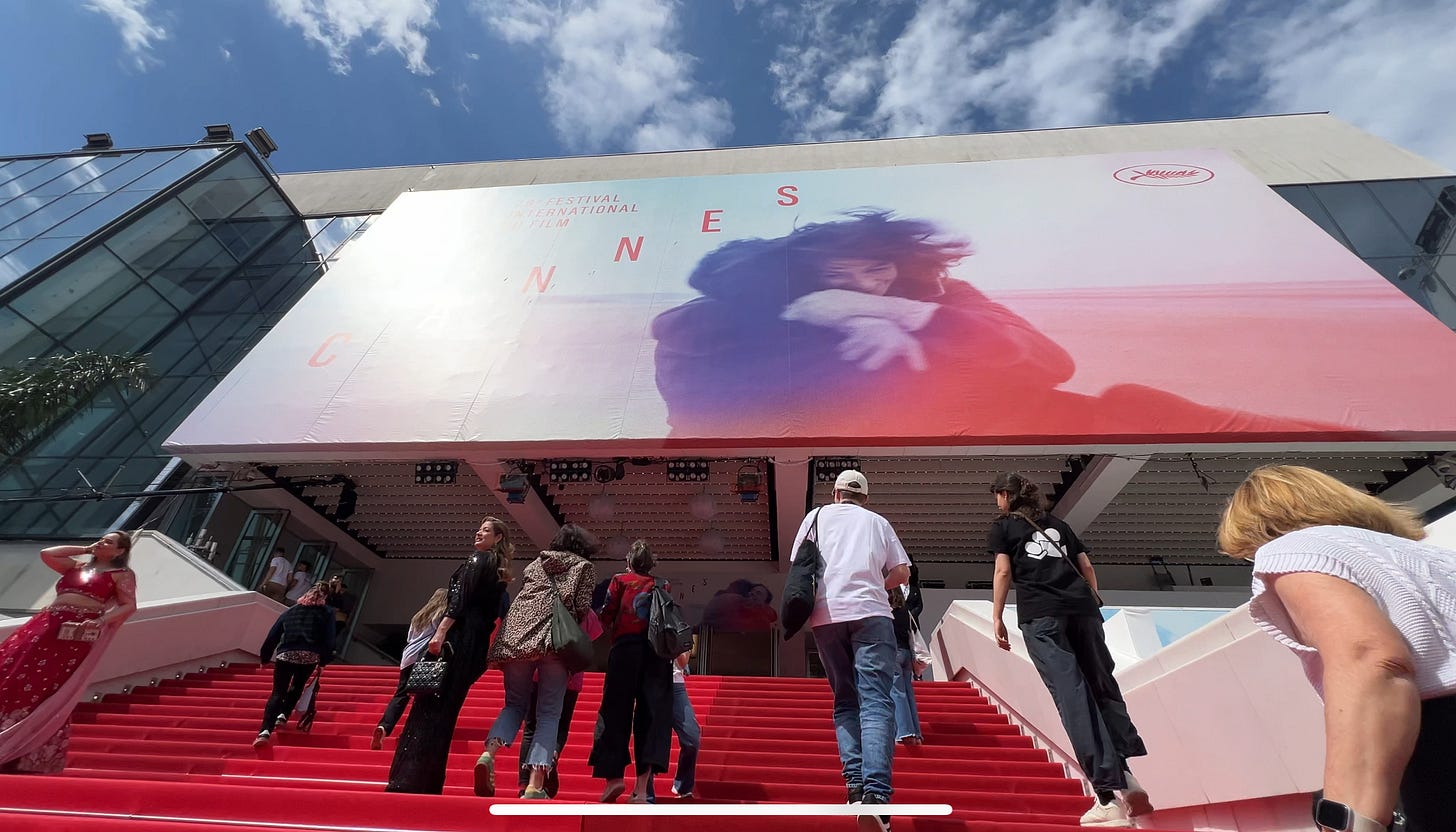
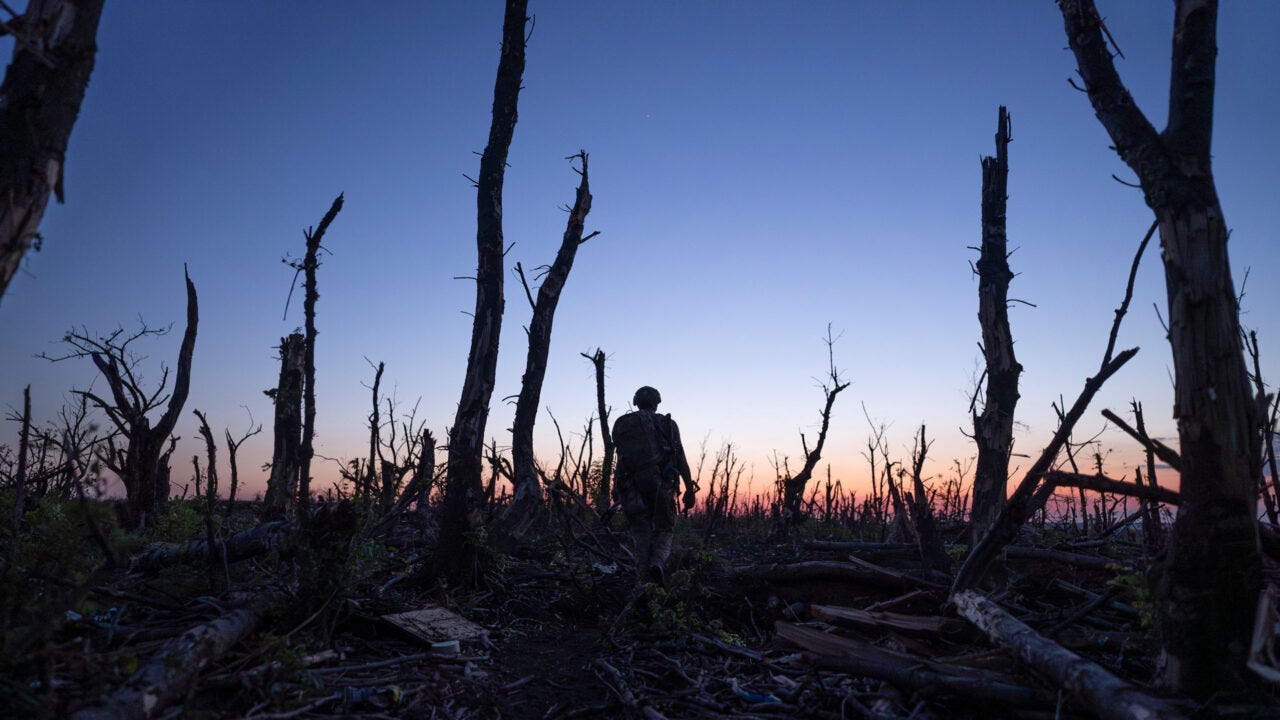
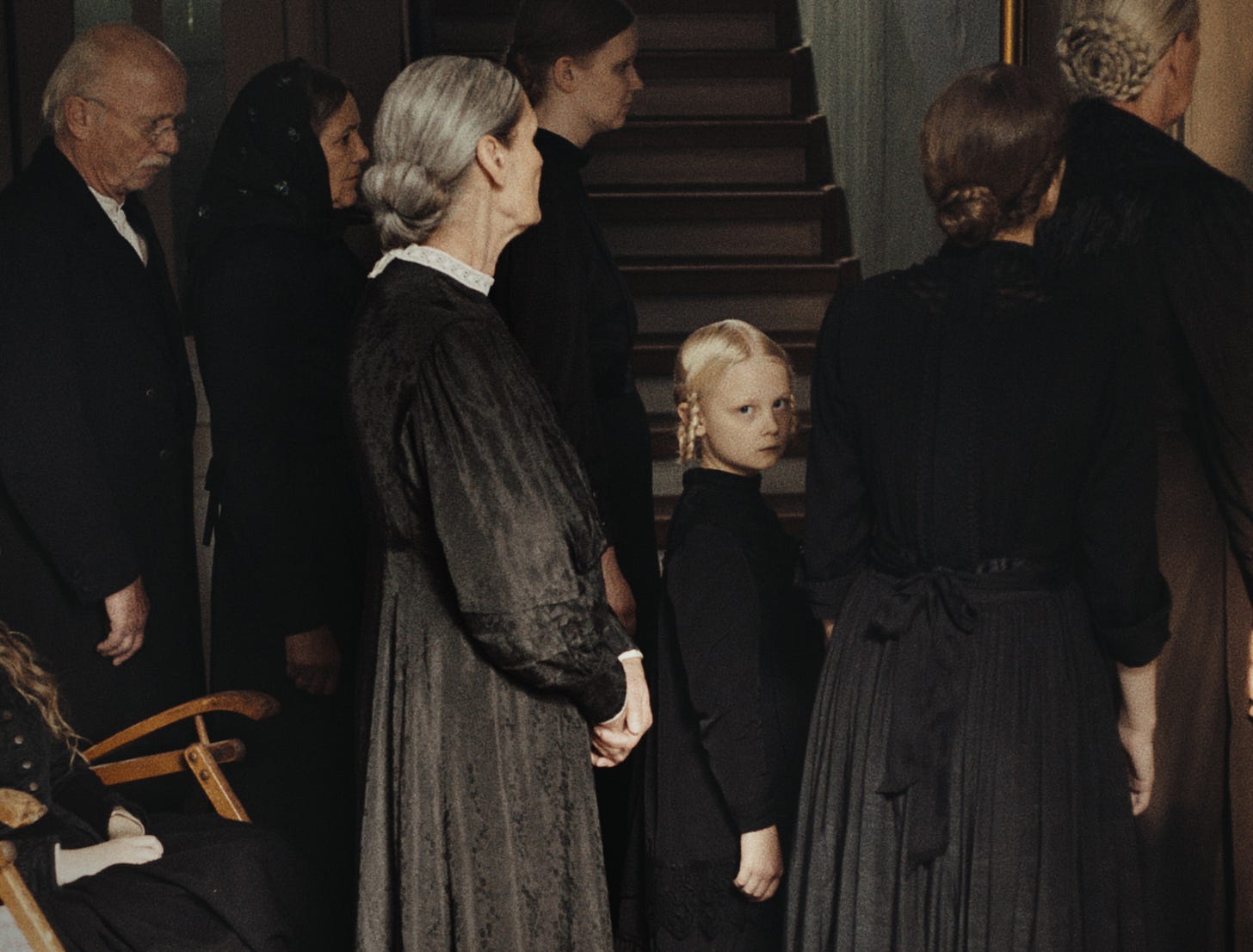
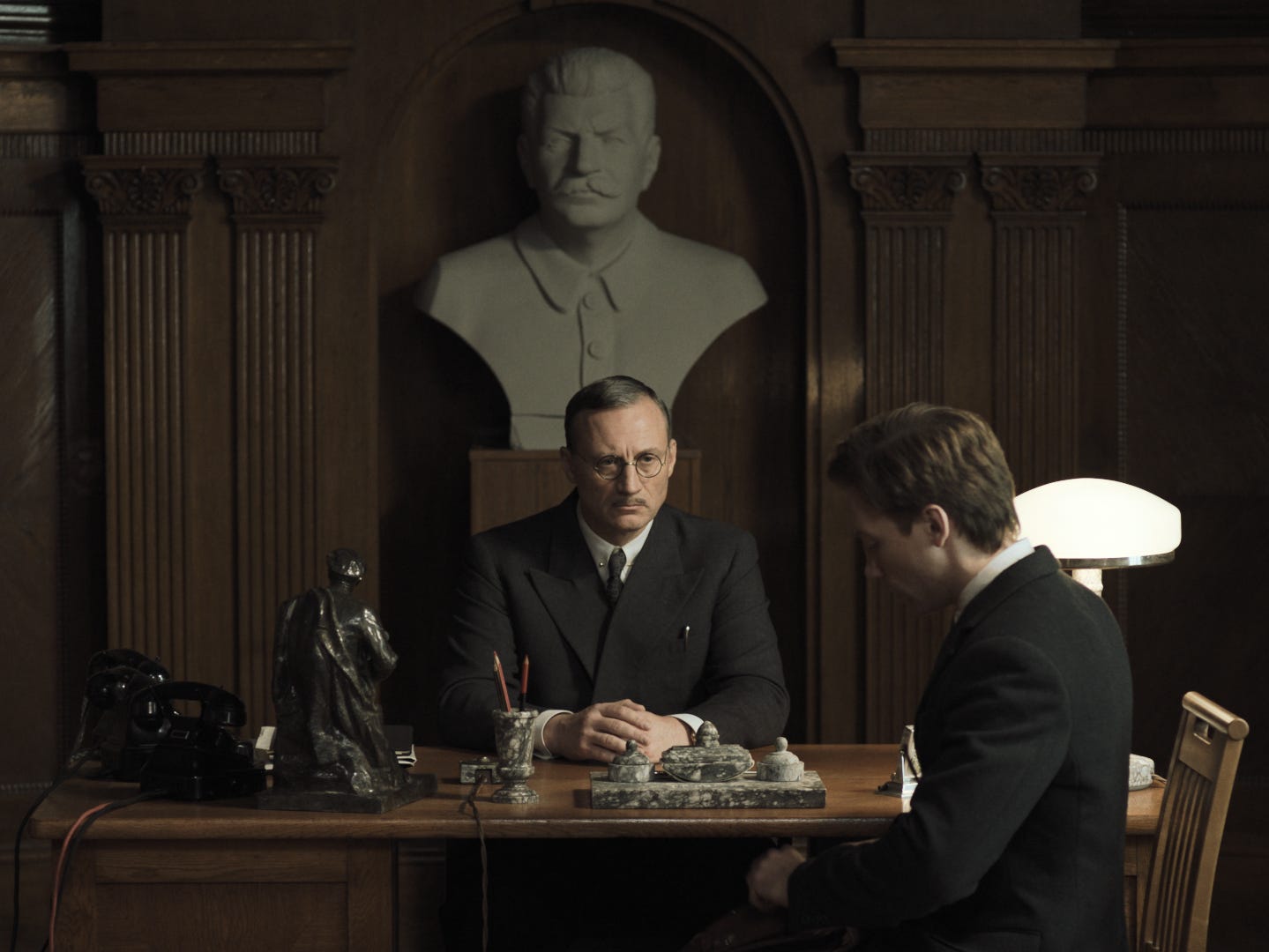
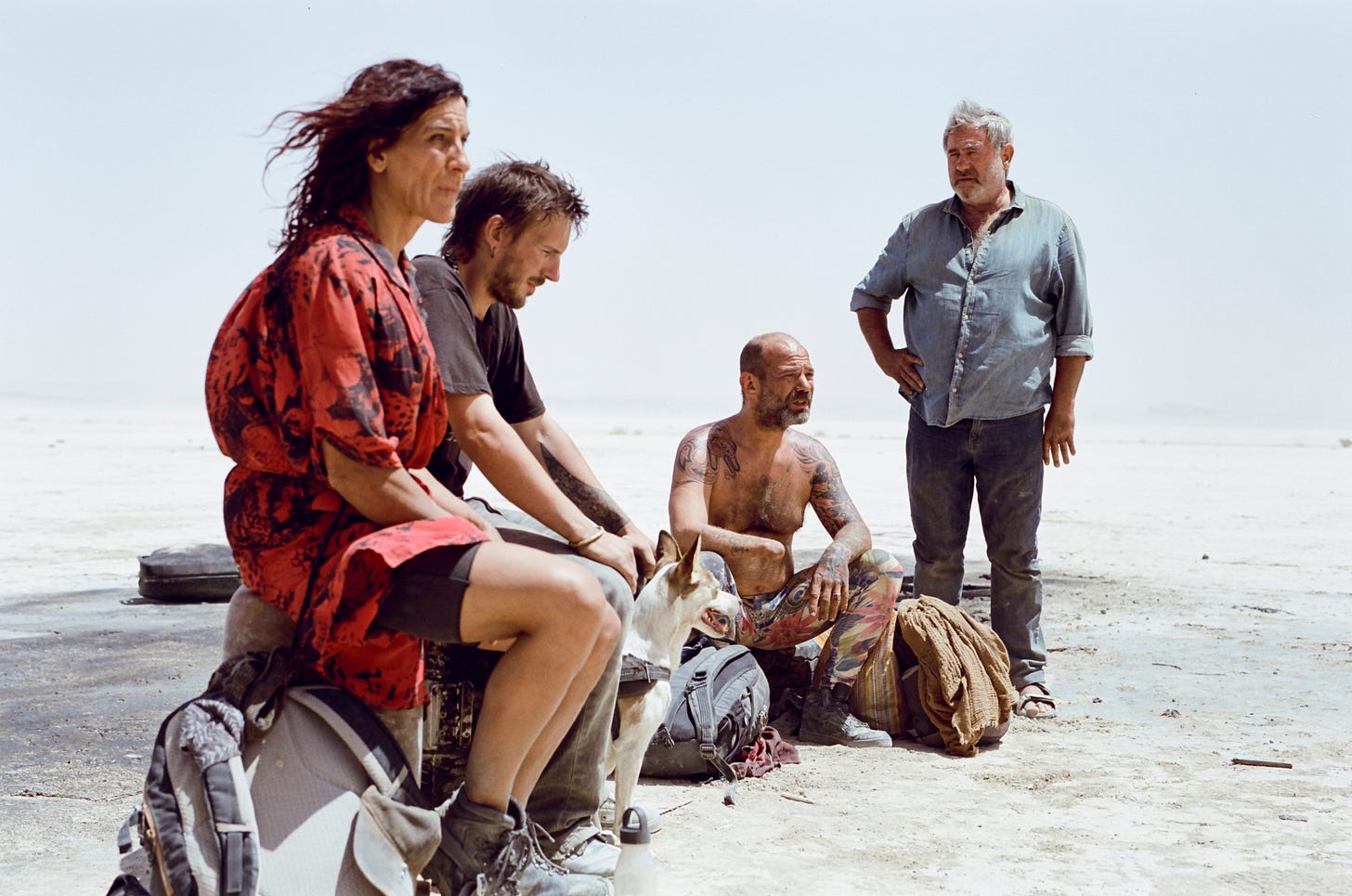
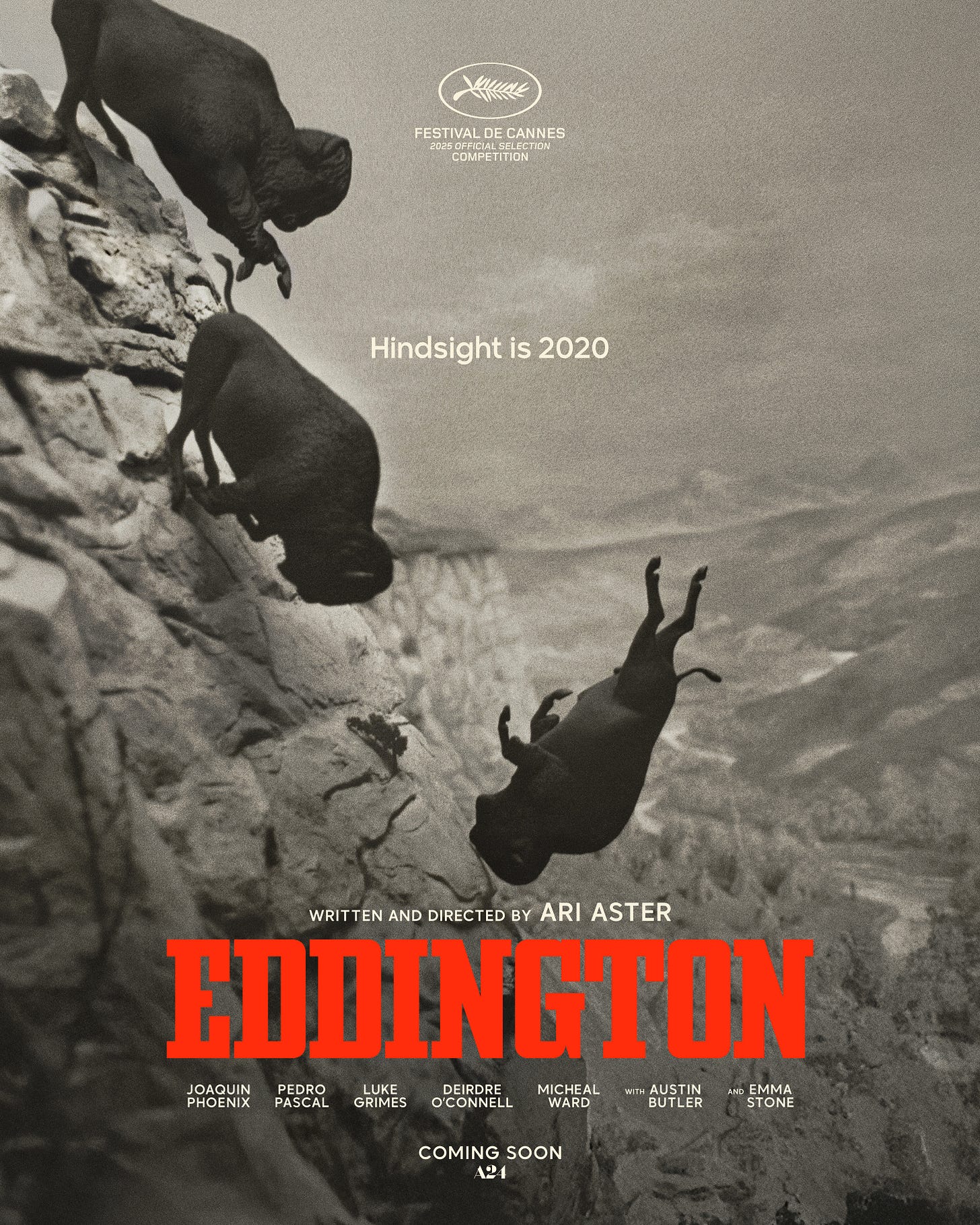
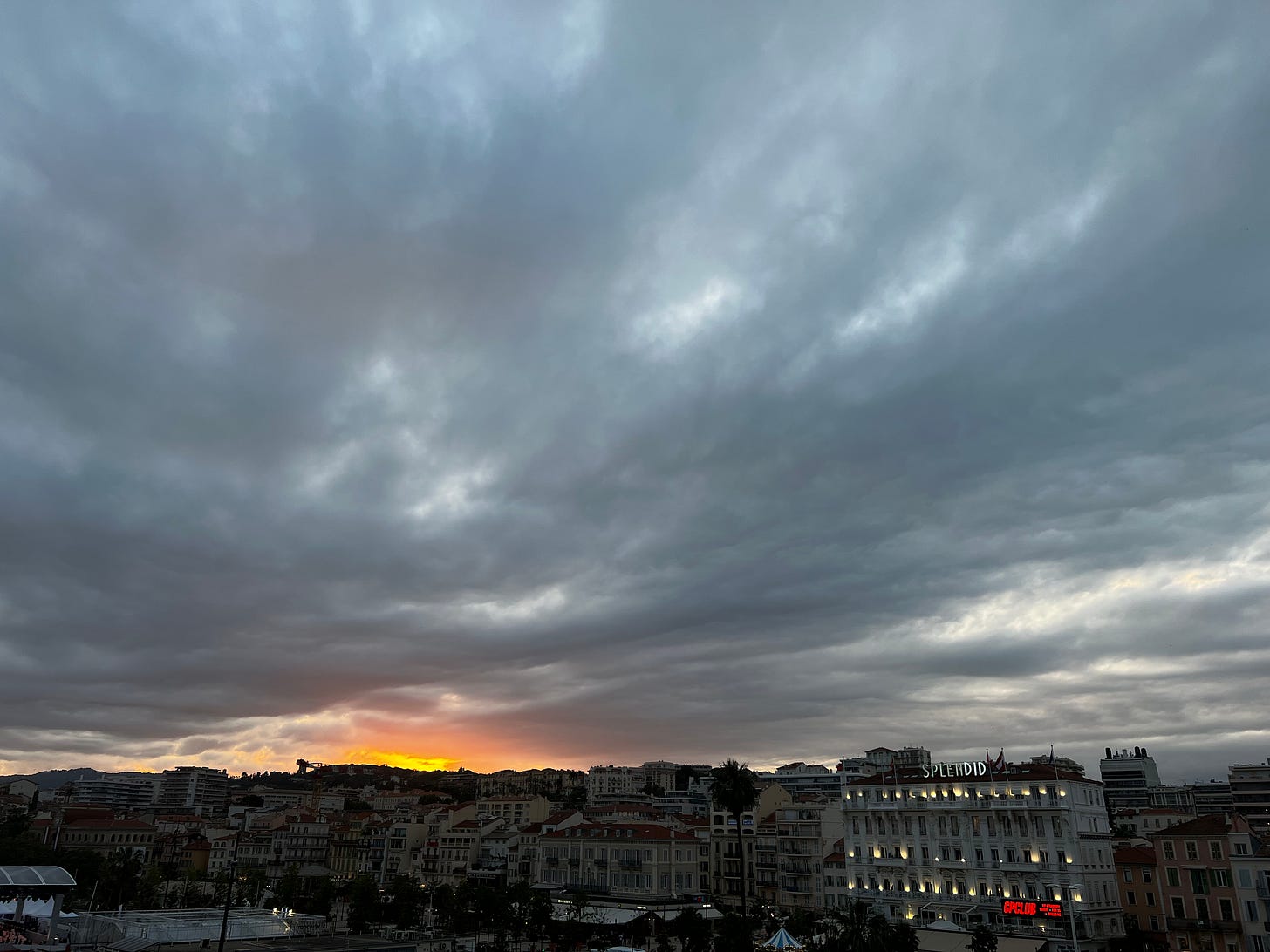
Hey, Thomas, I saw Eddington last night and looked forward to reading our review this morning. I was mesmerized by the film and woke up today thinking that it was quite brilliant. You were spot-on in your analysis of the overall reaction. From what I can tell, most critics don't like the movie. I feeling pretty good about it and look forward to seeing the rest of Aster's films. Thank you for this review!
Which film got the "4.5 hour standing ovation"?